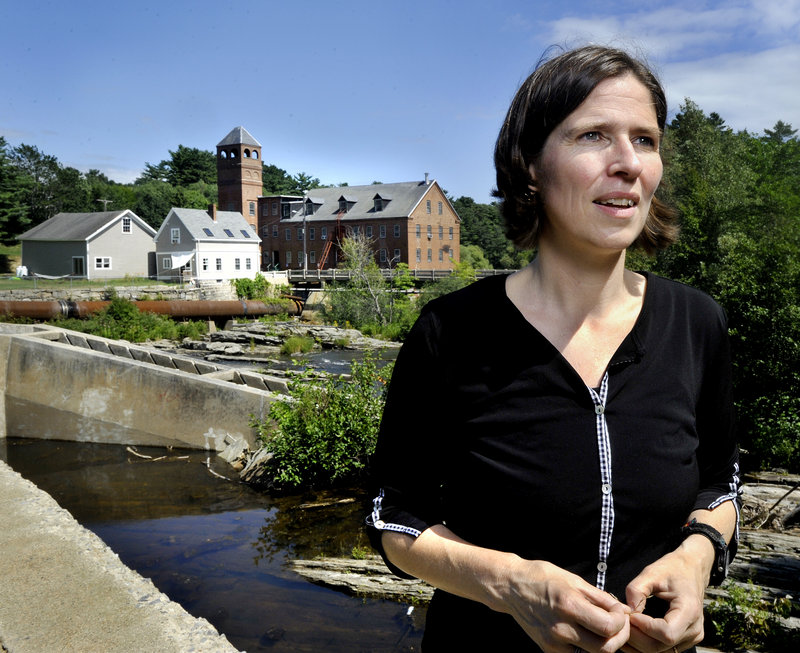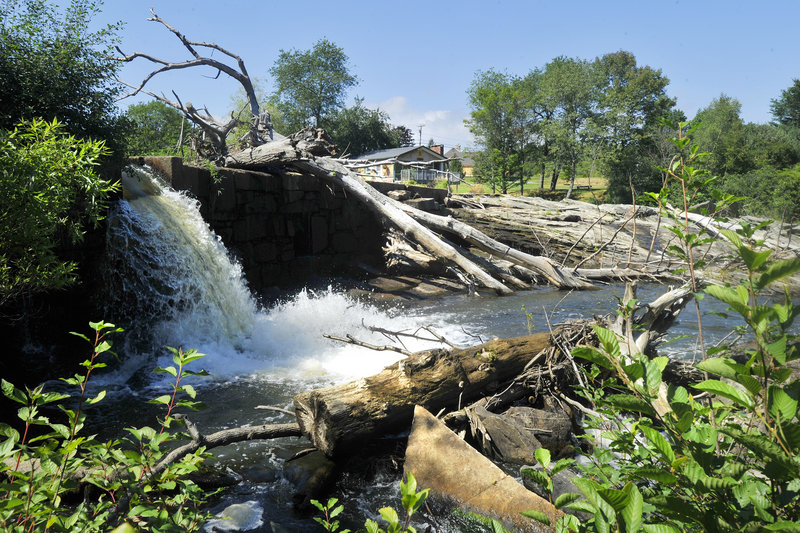YARMOUTH – The Royal River has been harnessed since the 1700s, held back by dams to provide power and water access to lumber and paper mills, fish- and poultry-processing plants, potteries and tanneries.
Now, those industries are long gone and town officials are struggling to maintain two old dams — one just above Bridge Street and the other just below East Elm Street — that effectively turn five miles of the river into a narrow, meandering lake.
It’s what some scientists call a “fake lake,” according to Landis Hudson, executive director of Maine Rivers, a local nonprofit that’s dedicated to preserving, restoring and enhancing the state’s rivers.
“It looks like a lake,” Hudson said, “but it has none of the health or vitality of a natural lake. It’s part of a whole system that has been greatly altered over the years.”
On Aug. 15, town officials plan to open the gates at the Bridge Street dam and draw down the river’s murky impoundment as far north as the East Elm Street dam.
For the first time in more than a decade, they will be able to inspect the Bridge Street dam for cracks or leaks and assess the condition of an abandoned fish ladder leased to the Maine Department of Marine Resources.
They also plan to survey and photograph the exposed riverbed to help create a digital rendering of how the river would look if its dams were removed and its waters were unleashed.
“The river is beautiful the way it is,” said Town Manager Nat Tupper. “We’re not trying to advocate for a change. We’re trying to inform a possible discussion. What we don’t want is to see the dams fail in their intended purpose but continue to function as barriers to the future health of the river. If we don’t want to remove them, we need to figure out a way to take care of them.”
That hasn’t been possible lately, Tupper said. The town’s budget is tight and money generated by a hydroelectric facility at the Sparhawk Mill, adjacent to the Bridge Street dam, is minimal.
Owned by Bob Poor of Granite Ridge Property Group in Yarmouth, the former grain-sack factory now houses several smaller businesses, Tupper said. One of three turbines in Poor’s hydroelectric plant is functioning, so most of the electricity is used by tenants.
Poor sells excess electricity to the power grid and shares the profits with the town, but that has amounted to less than $4,000 over the last several years, Tupper said.
The East Elm Street dam is another story. Town officials would like to draw down its impoundment and inspect the barrier for any structural problems, but it has no apparent release mechanism and they can’t find the design plans, which likely date back to the 1700s, Tupper said.
Migratory fish that might find their way into the Royal River if the dams were removed include eel, alewife, shad and salmon, joining other fish already in the river.
Yarmouth isn’t alone in its dam challenge. There are more than 1,000 dams in rivers across Maine, many of them abandoned and uncounted, said Hudson of Maine Rivers.
Successful removals include the Edwards Dam in Augusta on the Kennebec River and the West Winterport Dam on a tributary of the Penobscot River.
Restoring Maine’s waterways to their original, free-running state would bring back critical inland habitat for fish such as alewives, which spawn upstream and have dwindled in recent years, Hudson said.
A more robust alewife population would restore a vital food source for haddock and cod, and could help rejuvenate Maine’s flagging groundfishing industry, she said.
But Hudson understands that some residents may prefer the river as it is today. She lives in Yarmouth and has enjoyed strolling along its banks for years.
“The town’s really taking stock of its role as caretaker of this resource,” Hudson said. “Everyone in this community has a strong connection to the river. It’s up to the town to figure out the best way to care for the river going forward.”
Kathy Hassett is one Yarmouth resident who’s open to the idea of letting the river run free. She was at Royal River Park on Friday afternoon, sitting on the riverbank, reading a novel.
“I’d probably prefer it that way,” she said.
Staff Writer Kelley Bouchard can be contacted at 791-6328 or at:
kbouchard@pressherald.com
Send questions/comments to the editors.




Success. Please wait for the page to reload. If the page does not reload within 5 seconds, please refresh the page.
Enter your email and password to access comments.
Hi, to comment on stories you must . This profile is in addition to your subscription and website login.
Already have a commenting profile? .
Invalid username/password.
Please check your email to confirm and complete your registration.
Only subscribers are eligible to post comments. Please subscribe or login first for digital access. Here’s why.
Use the form below to reset your password. When you've submitted your account email, we will send an email with a reset code.